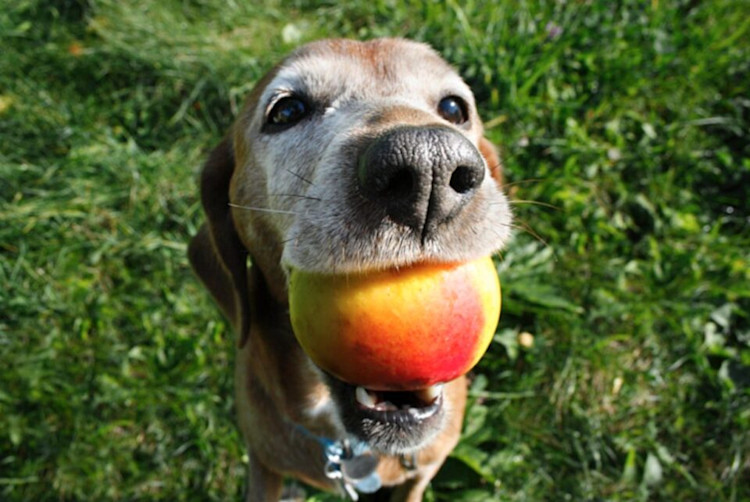Just like humans, many canines love fruits, but is mango safe for dogs? The short answer is yes, dogs can have mangoes. They're an excellent source of vitamins, but you need to be mindful of which parts of the fruit you serve and in what amount.
Let's get into more details on how dogs can eat mango safely.
- Are mangoes good for dogs?
- Are mangoes bad for dogs?
- How many mangoes can dogs eat?
- How to feed dogs mango
- Key Takeaways
Pro tip: If you have a pet that enjoys eating things they’re not supposed to, pet insurance is a great way to prepare for the unexpected so you don’t get stuck with the expensive bill after emergency surgery.
 Image source: The cup dog daily
Image source: The cup dog daily
Are mangoes good for dogs?
Yes, dogs can have mangoes as tasty treats and healthy snacks. The sweet fruit is a great source of vitamins, minerals, antioxidants, protein, and dietary fiber that all support good health in dogs.
Here are just a few benefits of giving your dog mango:
- Vitamin A promotes good eyesight (especially in senior dogs), helps in the prevention of cataracts, and assists with night blindness and dry eyes. Vitamin A also improves dogs' skin and coast, and it aids the proper functioning of the kidneys, liver, and lungs.
- High levels of antioxidants help boost dogs' immune system and defend against degenerative diseases, skin problems, allergies, as well as certain types of cancer1.
- Mangoes contain protein which can help with the repair of muscles and other important body tissues. They are also rich in potassium, which helps improve your pup’s nerves and muscles.
- The dietary fiber found in mangoes is great for your pup’s digestive system. It not only ensures everything runs smoothly in their digestive tract, but also alleviates the symptoms of diarrhea and constipation when they have an upset stomach.
Can dogs eat dried mango?
Dried mangoes are very high in sugar, calories, and carbohydrates. The drying process also deprives the fruit of some of its health benefits, so even though a small amount of dried mango won’t do any harm, you should stick to the fresh variety. Too much dried mango could cause stomach upset as well as tooth decay, leading to expensive dog teeth cleaning costs down the road.
Are mangoes bad for dogs?
Although the fruit offers many health benefits, mangoes can be bad for dogs under certain circumstances. Keep a close eye out for the following conditions and note that dogs
-
Mangoes are bad for dogs who suffer from medical conditions like pancreatitis or diabetes because they require a very specific diet to stay healthy. If your pet has any underlying condition, be sure to speak with your vet before adding new foods to their diet.
-
The skin on mango fruit is bad for dogs because it contains urushiol2, a component also found in poison ivy and poison oak that might produce a rash if it touches your pup’s skin. Mango skin can also be difficult to chew and digest, leading to possible stomach upset, vomiting, or blockage in the intestines.
-
The pit of a mango is bad for dogs as it presents a large choking hazard. If your pup manages to swallow a mango pit, it might get stuck in his or her stomach and cause serious, life-threatening issues due to intestinal obstruction.
What to do in case of obstruction
If you suspect your dog ate a mango pit, check for clinical signs of blockage such as:
- Diarrhea
- Vomiting
- Abdominal pain
- Decreased appetite
- Lethargy
- Difficulty breathing
- Constipation
- Stomach bloat
Some of these symptoms can be fatal if left untreated, so it's best to act immediately and seek emergency veterinary treatment. If you're unsure whether your dog ate a mango pit, consult your vet as soon as possible. They may advise diagnostic tests, like dog x-rays and a physical exam.
In the event your dog eats mango skin, you don’t have to be concerned right away. Just keep an eye on them and if you notice any signs of obstruction, like vomiting or diarrhea, get in touch with your vet.
Pro tip: With pet insurance, you can get reimbursed for the costs of major and minor illnesses, such as digestive problems, UTIs, ear infections, arthritis, and cancer. It can cover expenses for everything from the diagnosis to the treatment your dog needs to feel better. Having this kind of financial support can be a huge relief when dealing with the stress of caring for a sick pet.
 Image source: The Smart Canine
Image source: The Smart Canine
How many mangoes can dogs eat?
One-quarter cup of fresh mango once a week (or twice a week for large dogs) is an appropriate serving to prevent diabetes and obesity. Mangoes contain high amounts of sugar and have more calories than other dog-safe fruits, such as watermelon, so they should be given in moderation.
According to the United States Department of Agriculture4, one cup of mango contains 99 calories and 22.5 g of sugar. While fruit-based sugar is okay in moderation, too much of it could lead to adverse health effects.
When dogs eat mango in excessive quantity, they might end up with an stomach upset due to the fruit's high fiber content. Dietary fiber is good for dogs in moderation, but too much of it can result in diarrhea. As a general rule of thumb, treats should only account for 10% of your dog's daily caloric intake.
Remember that some dogs are allergic to mango, so you should always start by feeding them small amounts to confirm there are no side effects due to allergies. Ultimately, your vet is the best resource to determine how many mangoes you can feed your dog based on their weight, size, and medical history.
How to feed dogs mango
Here are some tips on how you can serve this tropical treat so your pup can enjoy all the benefits of mango for dogs:
- Wash the mango thoroughly
- Peel the skin off the flesh of the fruit
- Remove the large, central pit
- Slice the fruit according to your dog’s size (for smaller pups, bite-sized pieces are better to prevent choking hazards; bigger dogs can eat mango cut into larger slices since the flesh is very soft and easy to swallow)
You can also puree the mango and stir it into some cottage cheese to alleviate your dog's upset stomach, or freeze it with water in an ice cube tray and serve as a refreshing summer treat.
Note: Never feed your dog mangoes that have gone bad. Rotten fruit produces ethanol (alcohol), which is particularly poisonous to dogs. Symptoms of alcohol poisoning5 in dogs include vomiting, tremors, and seizures which would require immediate veterinary attention.
Key Takeaways
- Dogs can eat mango as an occassional special treat so long as the skin and pit are removed.
- Although the fruit is healthy in moderation, only give dogs mango in moderation to avoid obesity and gastrointestinal issues.
- Always check with your vet before feeding your dog new foods to confirm it's a safe addition to their diet.
References
- VCA Hospitals "Antioxidants" Accessed Mar. 15, 2021.
- Scientific American "Urushiol" Accessed Mar. 15, 2021.
-
- USDA "Mangoes" Accessed Mar. 15, 2021.
- VeterinaryPartner "Alcohol Poisoning" Accessed Mar. 16, 2021.
